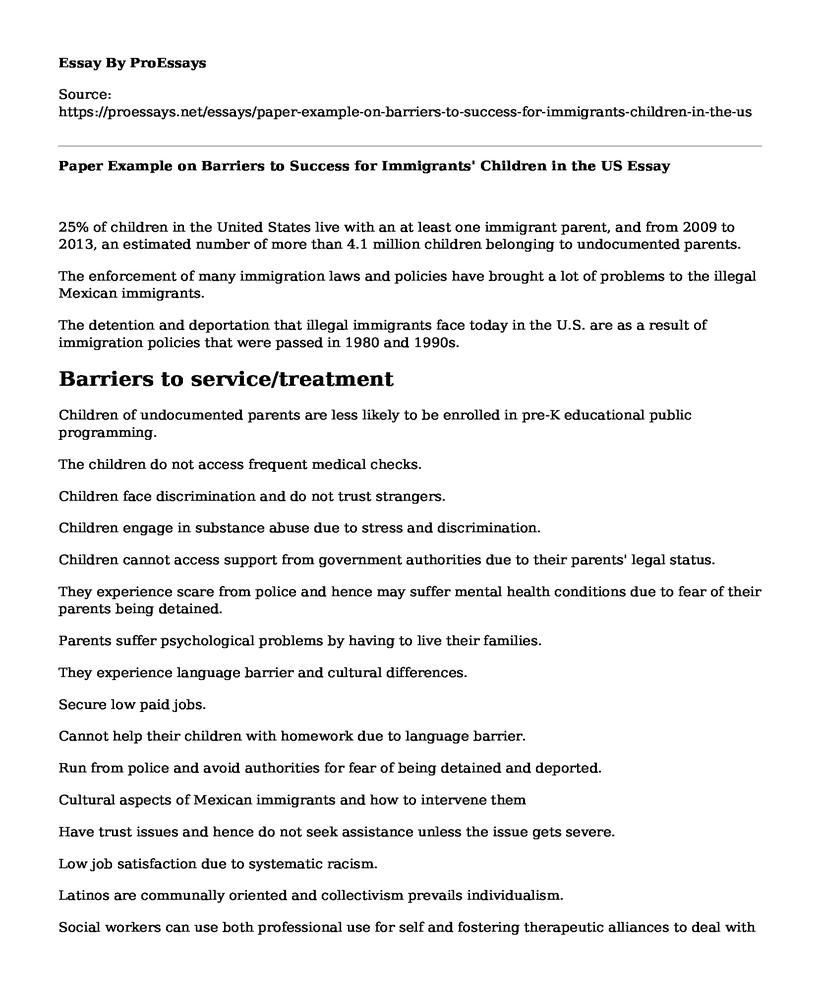25% of children in the United States live with an at least one immigrant parent, and from 2009 to 2013, an estimated number of more than 4.1 million children belonging to undocumented parents.
The enforcement of many immigration laws and policies have brought a lot of problems to the illegal Mexican immigrants.
The detention and deportation that illegal immigrants face today in the U.S. are as a result of immigration policies that were passed in 1980 and 1990s.
Barriers to service/treatment
Children of undocumented parents are less likely to be enrolled in pre-K educational public programming.
The children do not access frequent medical checks.
Children face discrimination and do not trust strangers.
Children engage in substance abuse due to stress and discrimination.
Children cannot access support from government authorities due to their parents' legal status.
They experience scare from police and hence may suffer mental health conditions due to fear of their parents being detained.
Parents suffer psychological problems by having to live their families.
They experience language barrier and cultural differences.
Secure low paid jobs.
Cannot help their children with homework due to language barrier.
Run from police and avoid authorities for fear of being detained and deported.
Cultural aspects of Mexican immigrants and how to intervene them
Have trust issues and hence do not seek assistance unless the issue gets severe.
Low job satisfaction due to systematic racism.
Latinos are communally oriented and collectivism prevails individualism.
Social workers can use both professional use for self and fostering therapeutic alliances to deal with Latino Mexican aspects.
Assessment tools
MECA theory to be applied to assess Latino families' genogram.
Gauging the knowledge of teachers on the Mexican immigrants in the community
Understanding the educational needs and experiences of the immigrants and using the Mexican strengths like culture and language to support their children both at home and at school
Programs/Associations
CLILA- It helps children with their homework, provide unglued classes and citizenship classes to all Latino children.
Ohio Hispanic Coalition- It provides Latino children who are less proficient in English by offering them education assistance in Spanish.
Hispanic Association- provides Adult Basic Education (ABE) to help them learn to speak English and DACA sponsorships.
Undocumented immigrants Services in the U.S
Case Scenario
Miriam and her mother Sara, migrated from Mexico and settled in US.
Miriam is 15 years and attends a nearby school.
Sara has a new boyfriend (John) who has moved to stay together.
John makes sexual advances towards Miriam and this affected her and started to miss school.
The school counselor learns about the case and reports to the case to Child Protective Services (CPS).
Miriam goes to live with her aunt who also has illegal status.
Miriam can get help from Child Welfare Agency Involvement, U Visa, and Foster Care placement
Cite this page
Paper Example on Barriers to Success for Immigrants' Children in the US. (2023, May 23). Retrieved from https://proessays.net/essays/paper-example-on-barriers-to-success-for-immigrants-children-in-the-us
If you are the original author of this essay and no longer wish to have it published on the ProEssays website, please click below to request its removal:
- Speeding in America Essay Example
- Wage Discrimination and the Residual Approach Paper Example
- Essay Example on Obama Care in Texas: Challenges for Payers
- Critical Essay on Pink Brain, Blue Brain: Boys & Girls in Schools
- Paper Example on Distracted Driving: Teens Increasingly Involved in Accidents and Fatalities
- Paper Sample on Gender Inequality: A Review of Male Dominance and Present-Day Solutions
- Essay Sample on Navigating Gay Rights: The Dilemmas & Challenges Facing the State







